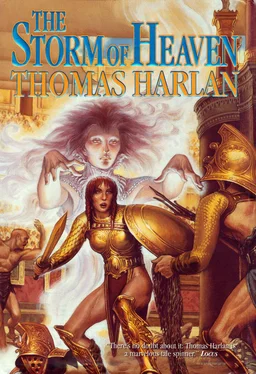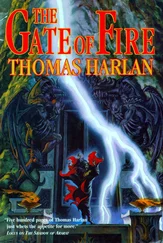Thomas Harlan - The storm of Heaven
Здесь есть возможность читать онлайн «Thomas Harlan - The storm of Heaven» весь текст электронной книги совершенно бесплатно (целиком полную версию без сокращений). В некоторых случаях можно слушать аудио, скачать через торрент в формате fb2 и присутствует краткое содержание. Жанр: Фэнтези, на английском языке. Описание произведения, (предисловие) а так же отзывы посетителей доступны на портале библиотеки ЛибКат.
- Название:The storm of Heaven
- Автор:
- Жанр:
- Год:неизвестен
- ISBN:нет данных
- Рейтинг книги:4 / 5. Голосов: 1
-
Избранное:Добавить в избранное
- Отзывы:
-
Ваша оценка:
- 80
- 1
- 2
- 3
- 4
- 5
The storm of Heaven: краткое содержание, описание и аннотация
Предлагаем к чтению аннотацию, описание, краткое содержание или предисловие (зависит от того, что написал сам автор книги «The storm of Heaven»). Если вы не нашли необходимую информацию о книге — напишите в комментариях, мы постараемся отыскать её.
The storm of Heaven — читать онлайн бесплатно полную книгу (весь текст) целиком
Ниже представлен текст книги, разбитый по страницам. Система сохранения места последней прочитанной страницы, позволяет с удобством читать онлайн бесплатно книгу «The storm of Heaven», без необходимости каждый раз заново искать на чём Вы остановились. Поставьте закладку, и сможете в любой момент перейти на страницу, на которой закончили чтение.
Интервал:
Закладка:
Thomas Harlan
The storm of Heaven
WHAT HAS GONE BEFORE
In the year 622, the Eastern Roman Empire was close to destruction, the capital of Constantinople besieged by the Avars in the West and Persia in the East. As told in The Shadow of Ararat, the Emperor of the East, Heraclius, and of the West, Galen Atreus, launched a daring attack into the heart of their Persian enemy. The half-mad Persian Shahanshah Chrosoes was taken unawares, and after great battles, he was defeated and his empire given as a wedding gift to the Eastern Prince Theodore. At the same time, while the two ancient powers strove to overthrow each other, two critical events transpired. First, in Rome, young Prince Maxian Atreus discovered an ancient thaumaturgic pattern-the Oath-constricting the lives and dreams of the Roman people. Aided by the Nabatean wizard and Persian spy Abdmachus, Prince Maxian embarked on an audacious quest to find the sorcerous power he needed to break down the lattices of the Oath and free the Roman people from their invisible slavery. Second, while the Prince exhumed and revivified Gaius Julius Caesar as a source of thaumaturgic power, a young Roman mage, Dwyrin MacDonald, was swept up in the chaos of the Eastern war.
Attempting to find and save his pupil, Dwyrin's teacher Ahmet left the ancient School of Pthames on the Nile and struck out into the Roman Levant. By chance, in the ancient, rock-bound city of Petra, Ahmet encountered an unexpected friend in the Mekkan pottery merchant Mohammed. Together, the teacher and the merchant found themselves in the service of Zenobia, Queen of Palmyra. At the urging of the Eastern emperor Heraclius, Zenobia and the princes of the Decapolis and Petra gathered an army to resist the advance of the Persian army, under the command of the Great Prince Shahin, into Syria. Unaware of Heraclius' intention to see the independent cities of the Decapolis destroyed while diverting Chrosoes' attention, Zenobia clashed with the Persians, was defeated and then besieged in Palmyra itself. Despite furious resistance, the City of Palms fell to the monstrous power of the sorcerer Dahak. Zenobia and Ahmet perished, and Mohammed escaped with only a small band of his followers through sheer luck.
While Persia collapsed, the Roman agent Thyatis, accompanied by the Khazar tarkhan Jusuf, entered the capital of Ctesiphon and stole away with mad Chrosoes' second wife, Empress Shirin, Jusuf's niece. Though she was supposed to deliver the Empress to Galen, Thyatis chose instead to disguise her escape and flee south, making a circuitous and eventful return to the Empire via southern Arabia, the East African coast and the black kingdoms of Meroe and Axum. A dangerous decision, not only for the terrible peril of the voyage, but to thwart the desires of her Emperor…
Not far away, in the ruined Imperial city of Dastagird, Prince Maxian found the last piece of his puzzle-a crypt holding the stolen, hidden remains of Alexander the Great. As he did with Gaius Julius Caesar, the Prince revivified the Macedonian and felt his power was at last sufficient to break the Oath strangling the Roman people.
In the year 623, as told in The Gate of Fire, the Roman armies of East and West returned home, and both nations rejoiced, thinking the long struggle against Persia and the Avar khaganate had at last come to an end. Great plans were laid, both by Heraclius and Galen, and many legionaries rested their weary feet. Yet, all was not well, either within the Empire or without. Heraclius' attempt to return home in triumph was spoiled by a sudden and unexpected illness. Galen's return was more joyful, for he found his wife, Helena, had borne him, at last, a son.
In Arabia the merchant Mohammed reached Mekkah to find his beloved wife, Khadijah, cold in the ground. Devastated, Mohammed climbed a nearby mountain and attempted to end his own life. As he stood poised between death and life, between the earth and sky, a power entered Mohammed, speaking to him from the clear air. The voice urged him to strive against the dark powers threatening mankind. Heeding this voice, Mohammed-after a brutal struggle in the city of his birth-set out with an army of his companions, the Sahaba, to bring the treacherous Emperor Heraclius to justice. To his surprise, he found many allies eager to overthrow the tyranny of the Eastern Empire. First, the rascal Khalid al'Walid, then the lords of Petra and Jerash and finally the exiled Queen of Palmyra, Zoe. With their aid, Mohammed raised the tribes and the cities of the Decapolis to war against Rome. Heraclius' treachery would be repaid with blood and fire.
Indeed, even in Persia the enemies of Rome did not lie quiet. The sorcerer Dahak escaped from the Roman victories with an army and he made his way to the ancient, remote fortress of Damawand, high in the mountains of Tabaristan. There, in a shrine once held holy by the priests of Ahura-Madza, the sorcerer began to muster a great power-not only of arms and men, but of darkness. Deep within the fortress lay a door of stone, behind which unguessed inhuman powers waited. Risking his life and the earth itself, Dahak opened the stone door to capture the power of the ancients. By these means, he shed the last of his humanity and became a true master of the hidden world. Flushed with strength, the sorcerer made his way to ancient Ecbatana and there-with the aid of his servant, Arad-placed the great general Shahr-Baraz on the throne of Persia. Now, a reckoning would come with Rome, and Persia's lost glory would be reclaimed.
In Rome itself, events rushed to a devastating conclusion. Prince Maxian, endowed with the strength of Julius Caesar's and Alexander's legends, strove again to overthrow the power of the Oath. Unable to sacrifice his brother Galen, the young Prince failed, nearly killing himself and wounding his companion Krista. Fleeing to the safety of his mother's ancestral estate on the slopes of Mount Vesuvius, Maxian struggled with his conscience. Unwilling to wait for his decision, Krista fled, bringing news of the Prince's whereabouts and fatal plans to the Duchess de'Orelio-the Western Empire's spymaster and secret priestess of the Thiran Order of Artemis the Hunter. Her position reinforced by the return of Thyatis, Anastasia ordered the Prince murdered.
Thyatis, Krista and their companions found the Prince on the summit of Vesuvius and, after a deadly battle, failed to kill him. The Prince, mortally wounded, opened himself to the power in the mountain, bringing himself back from death and inciting the somnolent volcano to a staggering eruption, which destroyed the cities of Baiae, Herculaneum and Pompeii. Maxian escaped aboard his iron dragon, while Thyatis chose to plunge from the flying craft into the burning wasteland rather than become his servant. Only the two survived, all else having perished in the cataclysm. Far away, in Persia, Dahak became aware of the Prince and his growing power, realizing a rival was emerging to contest his control of the world of men…
CHAPTER ONE
The Port of Korinthos, 31 B.C.
The sea gleamed like spoiled glass, a flat murky green. Smoke from the town hung in the air, drifting slowly along the beach in thin gray wisps. The Queen, her pale shoulders covered by a rose-colored drape, stood in the surf. Tiny waves lapped around her feet, making silver bangles lift and fall with the water. The sea was as warm as a tepidarium pool.
"No man has ever set foot on the island." The Matron's tone was harsh.
"This is my son," said the Queen, her voice urgent. "I need your help."
Sweat beaded on the Greek woman's face, even in the shade of a wide parasol that her servants had lodged in the sand. The Matron stood on the polished plank deck of a small galley, riding low in the water a dozen yards away. Despite the Queen's entreaties, the gray, stiff-backed woman had refused to leave the ship and come ashore.
Читать дальшеИнтервал:
Закладка:
Похожие книги на «The storm of Heaven»
Представляем Вашему вниманию похожие книги на «The storm of Heaven» списком для выбора. Мы отобрали схожую по названию и смыслу литературу в надежде предоставить читателям больше вариантов отыскать новые, интересные, ещё непрочитанные произведения.
Обсуждение, отзывы о книге «The storm of Heaven» и просто собственные мнения читателей. Оставьте ваши комментарии, напишите, что Вы думаете о произведении, его смысле или главных героях. Укажите что конкретно понравилось, а что нет, и почему Вы так считаете.











